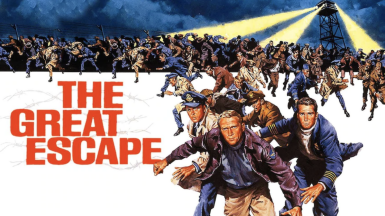
The movie The Great Escape is always featured on television during Christmas. That classic film about the Second World War is enjoyed by even those who dislike war films. 2023 will mark 60 years since it was released and, rather surprisingly, it's become a seasonal classic.
In case you're one of the people who've never seen it, The Great Escape is a fictionalised account of the mass breakout from the Stalag Luft III prison camp, which – spoiler alert – largely failed. Nevertheless, it's an engrossing film with some great actors, including the dominating performance of Steve McQueen and his motorbike. It is also a reminder of the days when stunts were achieved by real people in the real world rather than by pixels in computers, and when war's butchery was hinted at rather than depicted in every detail. I remember first seeing it 50 years ago as a teenager and it left a deep impression on me.
Why, though, for all its achievements, has The Great Escape, which barely mentions Christmas, become such a seasonal favourite? Oddities like this intrigue me because they often highlight what people are thinking. My take is that the idea of a prison-break connects at a deep level with everybody, for the simple reason that many – perhaps most – of us feel trapped in different ways. Perhaps we are stuck in the same dull job, perhaps we see life slipping past as we go nowhere.
I think this sense of being trapped – imprisoned – is made worse in our time because the world itself is becoming increasingly closed. A hundred years ago or more it was possible, at least in theory, to start a new life: to sail to Australia and a new beginning, to vanish without trace or take a boat to some blank space on a map in South America. But the world itself is no longer big enough to escape into. The white spaces on the maps have long been filled, opportunities fenced in by bureaucracy, and with a mobile phone you are never alone.
There is, too, a sense of cultural claustrophobia where our digital world often seems to know more about us than we do. There are other forms of being trapped: some people feel trapped in their own bodies, some imprisoned by their own psychology, still others held hostage by their past. And all of us are prisoners bound by time, ageing and death. It's a disturbing thought that The Great Escape is indeed 60 years old and that death has now claimed all the twelve lead actors. Outside any sort of faith, existence is a prison camp from which no one escapes alive.
In reality, I think the sense of being trapped and needing our own great escape goes deeper than any psychological claustrophobia. The philosophy of our age not only offers no jail-break but indeed screams that there is none. Life, we are told, is an escape room with no exit, a snakes-and-ladders board with serpents on every other square and a cell with no tunnel out to the free world.
One problem with this sense of being trapped is that often people seek an escape but choose a disastrous escape route. They assume a second marriage will solve the problems of the first, a new job will relieve the tedium of the old, a new home away from the hustle and bustle of the big city will bring calm.
The good news is that Christmas is about the big escape, not from the family and relatives! It's the idea at the very heart of Christmas, that in Jesus, God was entering his own world with the intention of rescuing us. God has not just spoken but has acted. In a way inevitably beyond understanding, the infinite and the eternal somehow became one of us – entering our existence to the point of being human. And he did it not simply to show solidarity or to learn what we endure, but to be one of us and lead us out.
In the introduction to John's gospel we get some profound thinking about what the nativity means. The eternal Word, God himself, becomes one of us; the infinite takes on flesh and heavenly light comes into earthly darkness. The closed system is broken open. We are promised that there's even an escape beyond the impregnable walls of death. Jesus, dying in order to destroy death, doesn't burrow his way out of the prison camp through a tunnel, but strolls out from the open tomb.
For the believer in Christ, Christmas points the way to our own escape from all that binds and entraps us. Jesus offers us the greatest of escapes into freedom, friendship with God and a future. Let's take it!
Canon J.John is the Director of Philo Trust. Visit his website at www.canonjjohn.com or follow him on Facebook, Instagram or Twitter.













